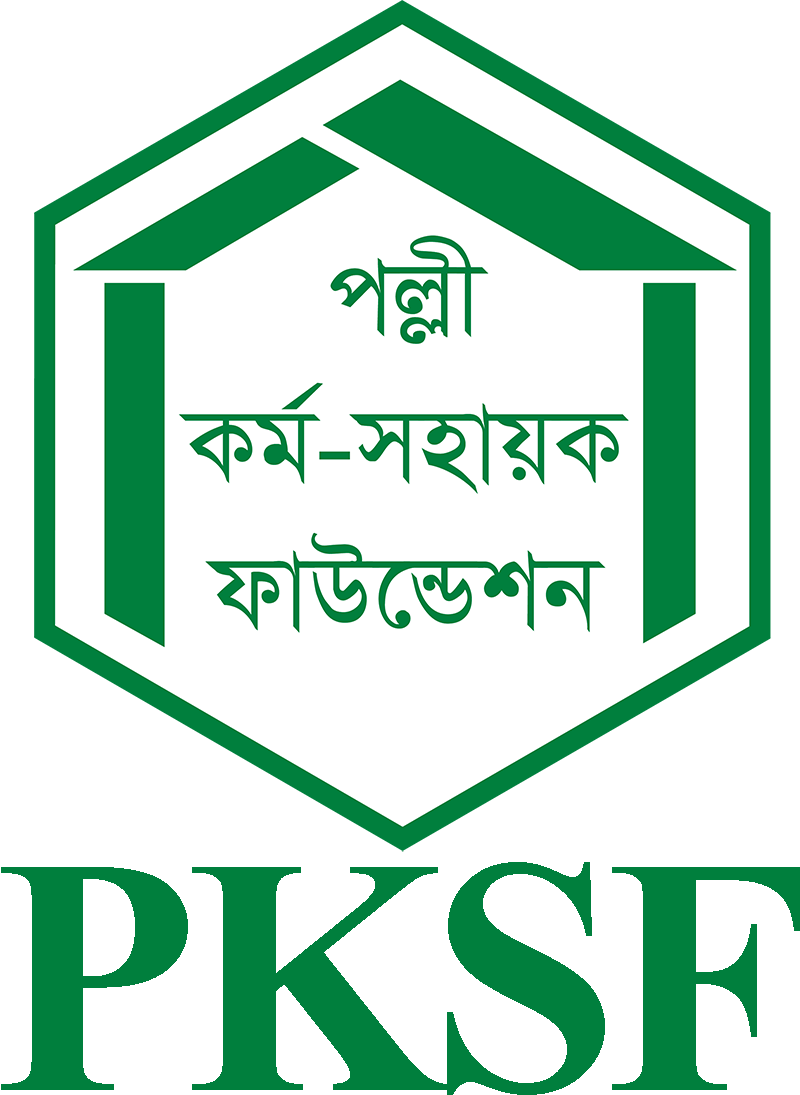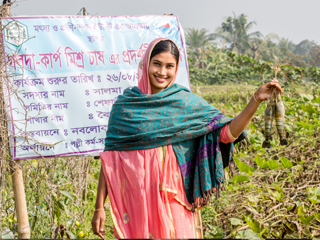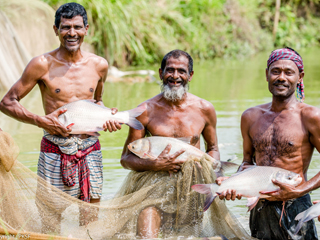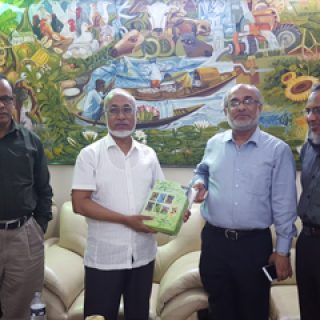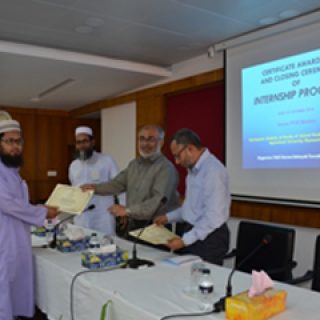Fisheries and Livestock unit
Poverty alleviation through sustainable development programmes for the poor and ultra-poor with appropriate financial services is the main motto of Palli Karma-Sahayak Foundation (PKSF). In view of this, PKSF provides a large amount of financial support to the program participants for livestock and fisheries related farming activities. Sustainable farming, increased income and poverty alleviation through livestock and fish production depend on proper implementation of the related activities. As per the resolution of the 182nd Board meeting, PKSF established the Livestock Unit (LU) in 2013. Later, this Unit was renamed as Fisheries and Livestock Unit (FLU) as per the resolution of the 205th Board meeting in 2016. The Unit aims to ensure sustainable aquaculture and livestock production through financial and technical support, skill development and quality assurance. Under FLU, there are two different cells namely, Fisheries Cell (FC) and Livestock Cell (LC). The FLU provides its services under the Operations Division of PKSF through its Partner Organizations (POs).
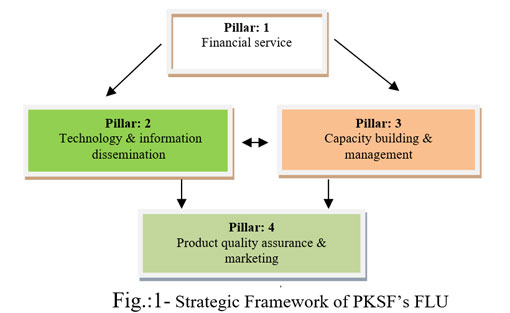
Poverty alleviation through sustainable development programmes for the poor and ultra-poor with appropriate financial services is the main motto of Palli Karma-Sahayak Foundation (PKSF). In view of this, PKSF provides a large amount of financial support to the program participants for livestock and fisheries related farming activities. Sustainable farming, increased income and poverty alleviation through livestock and fish production depend on proper implementation of the related activities. As per the resolution of the 182nd Board meeting, PKSF established the Livestock Unit (LU) in 2013. Later, this Unit was renamed as Fisheries and Livestock Unit (FLU) as per the resolution of the 205th Board meeting in 2016. The Unit aims to ensure sustainable aquaculture and livestock production through financial and technical support, skill development and quality assurance. Under FLU, there are two different cells namely, Fisheries Cell (FC) and Livestock Cell (LC). The FLU provides its services under the Operations Division of PKSF through its Partner Organizations (POs).
Activities
Technology demonstration: Under the FLU, technologies are demonstrated in order to ensure profitability of fisheries and livestock-related IGAs by using appropriate technologies at the farmer level. Good housing practices, effective feeding system, ensuring animal comfort, preventive veterinary care, timely breeding and environment-friendly waste management are the pre-requisites to sustainable and profitable livestock production. Good Aquaculture Practices (GAP) ensures sustainable commercial fish production in a cost effective manner.
Livestock Technologies: Improved technologies demonstrated under the LC include semi-intensive Black Bengal Goat rearing, intensive dairying, beef fattening, vermi-compost production, buck rearing, broiler rearing, layer rearing, sonali chicken rearing, duck rearing, quail rearing, rabbit rearing, fodder production, improved steer cattle fattening, beef cattle development through Brahma crossbred cattle rearing programme, buffalo rearing, hydroponic fodder production, unconventional feed marketing and turkey production. Selected members are being provided with appropriate financial services, technical advice and farming inputs such as breeding animal, day old chicks, fodder cutting/saplings, housing design, anthelmintics, vaccines, disinfectant etc. Till October 2018, the FLU implemented 34,946 livestock-related technologies, many of which are now being replicated in the community. Based on this replication, the LC has established 103 goat clusters each having at least 15 farms; 193 vermi-compost clusters with at least 20 farms in each; 15 quail clusters each with at least 7 farms; 10 hybrid layer clusters with at least 8-10 farms in each; 2 Turkey clusters each having at least 6-10 farms; 1 sheep cluster with 7 farms in it. The average monthly net income at the beneficiary level is between BDT 2,000 and BDT 2,500 from goat rearing, BDT 2,500 and BDT 3,500 from turkey rearing; and BDT 6,500 and BDT 9,000 from broiler duck rearing rearing.
Distribution of vaccines, anthelmintics & kit: The FLU has conducted vaccination program against the FMD, Anthrax, PPR, Newcastle Disease, and Duck Plague Disease, and also provided broad spectrum anthelmintics. So far, FLU vaccinated 9,28,100 animals and birds and provided deworming boluses to 2,87,693 large and small ruminant animals. In addition, the FLU has provided veterinary kits to the technical staff of the Partner Organizations to ensure preventive and curative veterinary services at members’ door-steps. The FLU has distributed California Mastitis Test (CMT) kits among the program-implementing organizations for the detection of mastitis in dairy cattle.
Fisheries Technologies: The FLU has implemented different fish production technologies such as carp-mola mixed culture, crap fattening, high value fishes like native shing, magur, tengra, pabda, gulsa and baim fish culture, carp-prawn polyculture, Vietnam koi culture, eel fish culture and fattening and fish culture in cages. Besides, it has also introduced vegetable cultivation on pond embankment/dike, ornamental fish culture, predator fish polyculture, giant pangas or white muscle pangas culture, vetki-tilapia polyculture, nursery pond rearer etc in 27 agro-ecological zones of Bangladesh. The FLU has also introduced cluster-based kuchia farming and high value native fish culture. Till October 2018, the FLU implemented 9,179 fisheries-related demonstrations, many of which are now being replicated among the fish farmers.
Fish fry release and Kit distribution: The FLU has released 88,980 kg fish fries in open water bodies to increase natural fish production and also distributed 7,231 pieces of fishing gears among the farmers.
Warning: Undefined array key "justified_height_tablet" in /home/pksforg/public_html/wp-content/plugins/bighearts-core/includes/elementor/widgets/wgl-gallery.php on line 1063
Warning: Trying to access array offset on value of type null in /home/pksforg/public_html/wp-content/plugins/bighearts-core/includes/elementor/widgets/wgl-gallery.php on line 1063
Warning: Undefined array key "justified_height_mobile" in /home/pksforg/public_html/wp-content/plugins/bighearts-core/includes/elementor/widgets/wgl-gallery.php on line 1064
Warning: Trying to access array offset on value of type null in /home/pksforg/public_html/wp-content/plugins/bighearts-core/includes/elementor/widgets/wgl-gallery.php on line 1064
Warning: Undefined array key "gap_tablet" in /home/pksforg/public_html/wp-content/plugins/bighearts-core/includes/elementor/widgets/wgl-gallery.php on line 1066
Warning: Trying to access array offset on value of type null in /home/pksforg/public_html/wp-content/plugins/bighearts-core/includes/elementor/widgets/wgl-gallery.php on line 1066
Warning: Undefined array key "gap_mobile" in /home/pksforg/public_html/wp-content/plugins/bighearts-core/includes/elementor/widgets/wgl-gallery.php on line 1067
Warning: Trying to access array offset on value of type null in /home/pksforg/public_html/wp-content/plugins/bighearts-core/includes/elementor/widgets/wgl-gallery.php on line 1067
Capacity building under the FLU
Farmers’ training: Under the FLU, 38,030 members received training on different fisheries and livestock technologies as of April 2018. Besides, the Unit also arranged training for 250 livestock and poultry service providers at the member level.
Training & Exposure visit: The FLU has trained 225 staff of the POs on different livestock technologies. It has also organized exposure visits to successful demonstrations of livestock technologies for 611 staff of the POs. Besides, 24 PO staff received training on ‘Good Aquaculture Practices (GAP)’ at Bangladesh Fisheries Research Institute (BFRI). The FLU has also organized training-cum-exposure visit for 72 PO staff on aqua cultural practices.
Other activities
Internship Program: Internship program for the undergraduate students of the Faculty of Animal Husbandry of Bangladesh Agricultural University (BAU) has been arranged by the FLU at PKSF Bhaban and its POs. A total of 32 students were introduced to PKSF’s livestock and financial activities. After completion of the internship program, every intern was awarded a certificate by Mr Golam Touhid, Deputy Managing Director of PKSF.
Collaborative Activities: PKSF DMD Mr Golam Touhid met Vice-Chancellor Professor Dr Md Ali Akbar of BAU on 12 November 2018. A fruitful discussion on future collaborative activities between PKSF and BAU took place.
